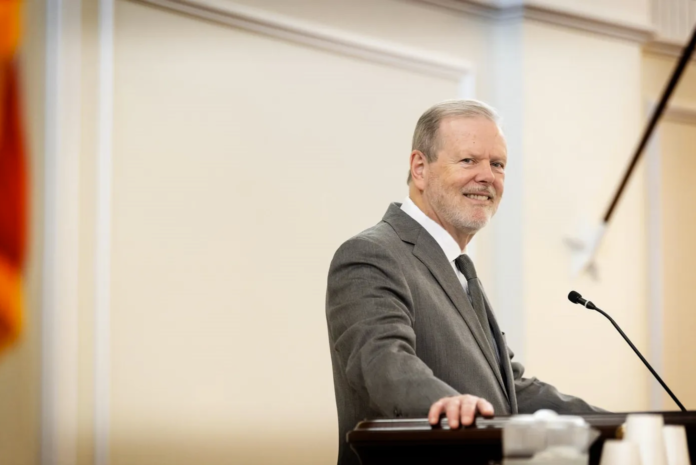Fourteen years ago, I stood here, and we began a journey that fundamentally transformed our state government and our state. At that time, we faced staggering challenges that were the consequences of decisions made over the previous decades.
It was clear that we could not continue down the same path. We had to chart a different course.
And that’s what we’ve done.
We moved away from the unsteady rollercoaster of boom-and-bust budgets, toward consistent, conservative, fiscally sound budgets.
We steered away from high taxes and burdensome regulations that stymied private sector growth, toward transformational tax reform and reductions.
We took a fresh look at education, enacted reforms, challenged entrenched bureaucracies, and created new opportunities for students and families.
What began on that Opening Day was a paradigm shift, and in many respects, a generational change.
Today, without question, North Carolina is the best state in America in which to live, work, start a business, and raise a family — a state of unparalleled opportunity.
Nevertheless, there is still work to do.
We want a state where citizens can follow their dreams, succeed, and raise families.
North Carolina’s traditional public school system is now bolstered and supplemented by diverse school choice options — public charter schools, private schools, and home schools. Our community colleges and universities are the envy of the nation, producing a talented workforce capable of filling the jobs being created in our dynamic economy.
Without a doubt, education continues to be the key that unlocks the door to a brighter future.
We must work to improve both educational opportunities and educational outcomes.
We must work together to safeguard and improve the good things about our state.
We cannot be complacent. We are competing with 49 other states and a multitude of foreign economies. We must continue to pursue policies that create and expand our competitive advantage, policies that have made today’s North Carolina an economic and opportunity powerhouse.
There is, and always has been, greatness in our state, greatness in our people.
As we approach America’s 250th anniversary and America celebrates the giants like Washington, Madison, and Hamilton, we recall North Carolinians who declared independence three months before Jefferson’s declaration — Joseph Hewes, William Hooper, John Penn, and the delegates who adopted the Halifax Resolves. We continue to work to be a state that lives up to the high standards enunciated in those documents.
Like those North Carolinians who preceded us — regular folks who stepped up to lead — we are ordinary people entrusted to make decisions for an extraordinary state.
Like them, we bring to this chamber unique experiences and knowledge, and are expected to work together, to do our best — to leave the state in a better place than we found it.
Today, hundreds of thousands of families see North Carolina as a place of opportunity.
Twenty-five years ago, our state’s population was eight million. We just surpassed 11 million. We’re the ninth-largest state, and well on our way to being the seventh-largest within the decade.
This growth presents challenges for us as policymakers.
How we deal with those challenges will impact the North Carolina we leave to our children and grandchildren. Education, infrastructure needs, childcare, healthcare, and dozens of other issues will present themselves to us over the next two years.
And for this session, we have another issue: We must take a renewed look at how we prepare for and respond to natural disasters in our state. Many of our citizens in Eastern North Carolina were left behind by the previous administration — citizens who have not returned to a permanent home after Hurricane Florence, more than six years later.
That is unacceptable.
I hope we can partner with Gov. Stein and his administration to ensure that response doesn’t become the norm.
Last year the General Assembly was able to quickly put $1.1 billion toward Hurricane Helene response efforts. We cannot do this alone. The federal government recently appropriated additional funds, but we’re going to need continued and additional support from Congress to ensure that we can adequately respond. I want to thank our Congressional delegation for all the work they’ve done thus far to advocate for Hurricane Helene recovery funding for Western North Carolina.
But all of that is just the beginning. I implore everyone in this room to come together to find ways to improve our response and recovery efforts.
To the people of Western North Carolina — You are not and will not be forgotten.
We will work tirelessly to ensure that our response to Hurricane Helene does not leave you behind.
It is not an exaggeration to say that had we not taken seriously our mission to reform how state government operates in North Carolina, we would not have the capacity we have today to respond to Hurricane Helene.
There were naysayers fourteen years ago.
Frankly, there still are.
But our conservative approach has lifted our state out of a dark place.
We’ve made incredible strides in improving education, facilitating access to healthcare, supporting public safety and law enforcement, reducing burdensome regulations, and providing our citizens with the tools they need to take control of their future.
I’ve been bullish about North Carolina for decades. Over the last fourteen years, I’ve seen our state grow and thrive in ways I could only have imagined.
It has been an honor to stand side-by-side with all of you to usher in this new era.
To the people of North Carolina, thank you for trusting us to serve you.
May God bless this chamber and God bless North Carolina.




